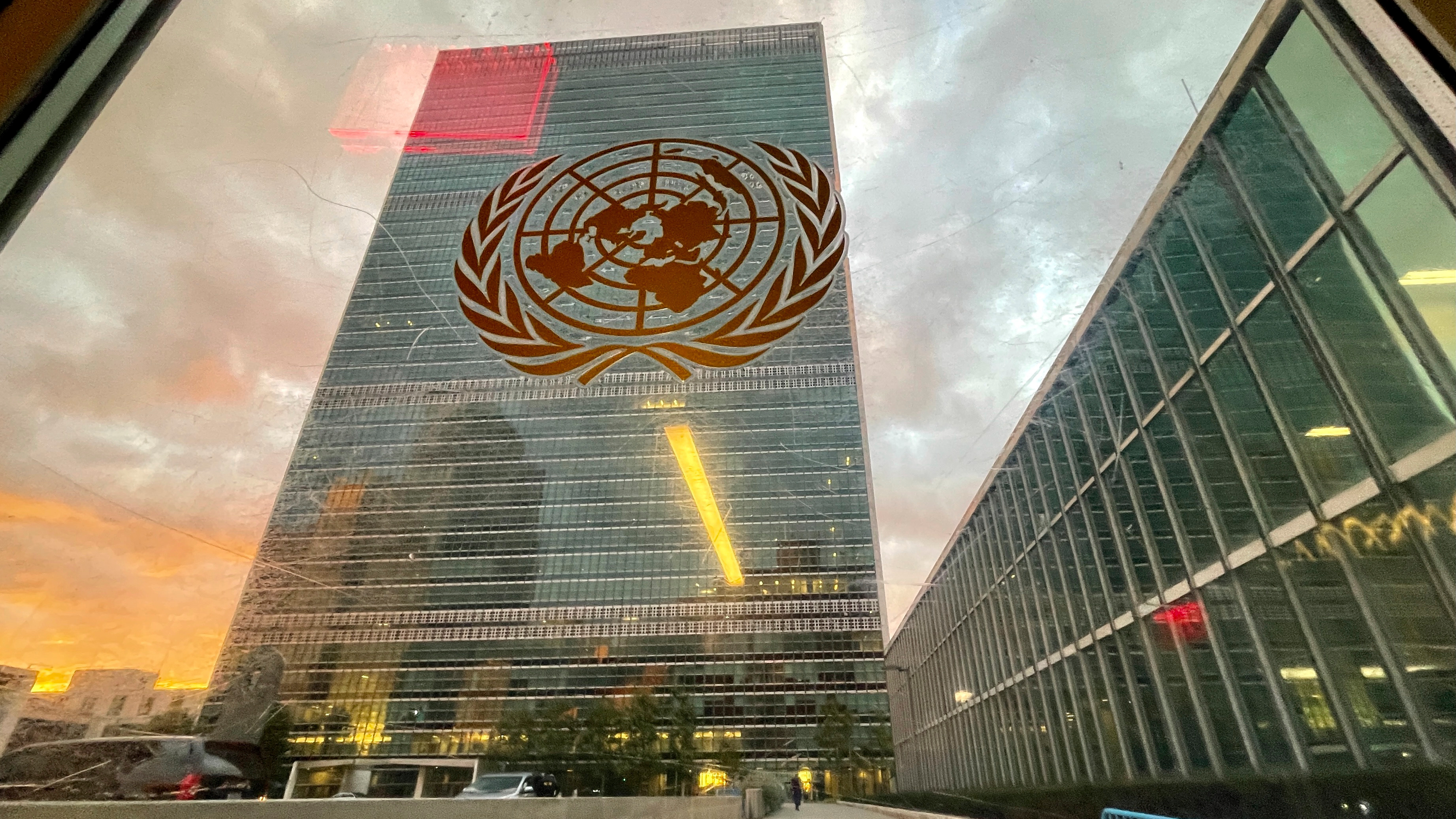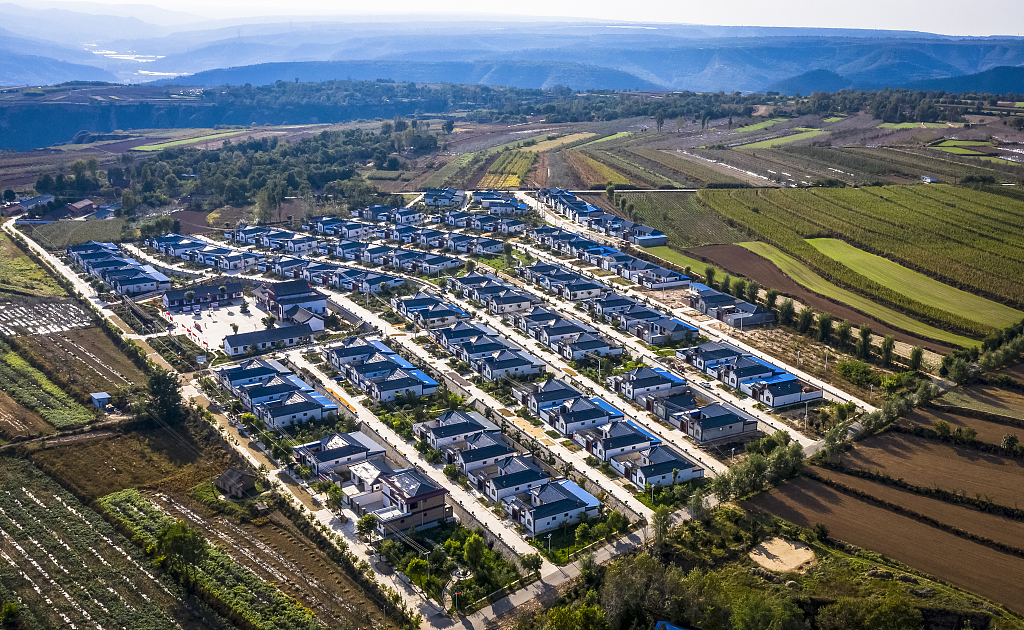
The United Nations headquarters building is seen from inside the General Assembly Hall in New York City, United States, September 21, 2021. /AP
The United Nations headquarters building is seen from inside the General Assembly Hall in New York City, United States, September 21, 2021. /AP
Editor's note: Bradley Blankenship, a special commentator on current affairs for CGTN, is a Prague-based American journalist, political analyst, and freelance reporter. The article reflects the author's opinions and not necessarily the views of CGTN.
With the UN Sustainable Development Summit in New York in full swing from September 18 to 19, leaders are facing a monumental challenge. In 2015, UN Member States agreed to 17 ambitious Sustainable Development Goals (SDGs) to be met by 2030, which are aimed at improving economic development, social welfare, and environmental protection. Due to a number of crises – the COVID-19 pandemic and the conflict in Ukraine to name a few – the SDGs are, however, looking grim.
At the halfway point, UN Secretary-General António Guterres said that the goals, which had previously made modest progress from 2015 to 2019, are "disappearing in the rearview mirror." Of the 140 total SDG targets that are being cataloged, UN members are on pace to meet only 15 percent. By contrast, we are "moderately or severely off track" on about half of them and at a stand-still or backsliding on 37 percent. Extreme poverty and food and water insecurity have increased for the first time in a generation, according to the 2023 SDG report.
Against this backdrop, leaders will get again to revisit the SDGs and discuss how the world can try to meet these noble goals. According to the UN's annual report on the matter, the list of countries that are making the most progress on meeting the SDGs is dominated by European countries.
The United States, one of the wealthiest countries in the world, for its part, move up two places to a dismal 39th place. Last year was notable for the U.S., as the UN pointed out that Washington exhibits "the least support for the 2030 Agenda and the SDGs."
It also said that the U.S. is one of a few UN member states to never submit a Voluntary National Review, which is meant for governments to share knowledge and insights with the global community on development. The U.S. also has a very low Spillover Score, indicating that it is not helping other countries achieve their SDGs. The lowest "spillover" countries are, paradoxically, dominated by the same European countries that are apparently making extensive SDG progress.
China, the second-largest economy in the world, is in an interesting place. A developing country itself, China is ranked 63rd (out of 166) in terms of SDGs progress – though, to its credit, it has made exceptional progress on poverty eradication and developing education. The country is improving on eight other goals while only moving backward on one, according to the UN.

An aerial view of newly built houses at a remote village in Pingliang, northwest China's Gansu Province, September 28, 2019. /CFP
An aerial view of newly built houses at a remote village in Pingliang, northwest China's Gansu Province, September 28, 2019. /CFP
But remarkably, Beijing has a Spillover Score of 94.5/100, which places it somewhere in the middle of the pack. Global South countries mostly do not have negative impacts on other countries, as their overall footprint is comparatively minimal. But because of China's large economy and its wide-spanning economic ties, this is a remarkable score.
The UN score shows that not only is China not pushing other countries to backslide but it is helping other countries achieve their SDGs. In January 2021, the State Council Information Office of the People's Republic of China released a white paper titled "China's International Development Cooperation in the New Era" that described China's growing role in the international scene as it entered into a new developmental period. More than anything, this paper stressed South-South cooperation as the most crucial part of China's role in international development.
In September of that same year, Chinese President Xi Jinping announced the Global Development Initiative (GDI) at the UN, and by the next year over 60 countries had signed on as "Friends of the GDI." The initiative was praised by the World Economic Forum as a "timely call-for-action to address the immediate challenges that threaten our collective ability to deliver on the Sustainable Development Goals."
Last year, the Communist Party of China had its 20th National Congress, which saw a recognition of the fact that China had accomplished its first centenary goal of "Xiaokang," i.e., becoming a "moderately prosperous country" in all respects. The Party vowed to pave a path forward for its second centenary by establishing new goals for the party, namely transforming China into a "modern socialist country" by 2049. This will be rooted in fulfilling socialist modernization by 2035.
It can be said that the GDI complements China's current development model. Analysts believe that the projects under the purview of the initiative, from Beijing's point of view, will be more sustainable and mutually profitable than, for instance, those started under the Belt and Road Initiative. This will help the country develop its internal consumer market better and drive domestic consumption, which policymakers are keen on and will ultimately help China's own progress in achieving the SDGs. It is to be hoped that more countries will sign on to the GDI after this latest summit to facilitate this goal.
(If you want to contribute and have specific expertise, please contact us at opinions@cgtn.com. Follow @thouse_opinions on Twitter to discover the latest commentaries in the CGTN Opinion Section.)